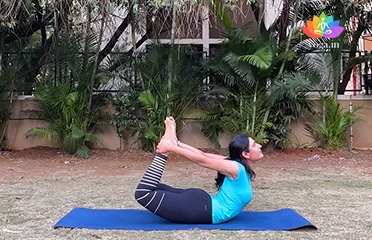Dhanurasana (Bow Pose)
धनुरासन / Bow Pose
The Sanskrit name is derived from Dhanur (धनुर) means bow and Asana [�K]
Matsyendrasana (Lord of the Fishes Pose)
मत्स्येन्द्रासन / Lord of the Fishes Pose
The name Matsyendrasana is derived from the Sanskrit words Matsya (मत्स्य) [�K]
Padmasana (Lotus Pose)
पद्मासन / Lotus Pose
The Sanskrit name is derived from Padma (पद्मा) meaning lotus and [�K]
Sarvangasana (Shoulderstand)
सर्वाङ्गासनI / Shoulderstand
The Sanskrit name is derived from Sarva (सर्वाङ्ग) meaning all, [�K]
Sirsasana (Headstand)
शीर्षासन / Headstand
The Sanskrit name is derived from Sirsa (शीर्ष) meaning head and asana [�K]
Ushtrasana (Camel Pose)
उष्ट्रासनI / Camel Pose
The Sanskrit name is derived from Ushtra (उष्ट्रासनI) meaning [�K]
Virasana (Hero Pose)
वीरासन / Hero Pose
The Sanskrit name is derived from Vira (वीरा) meaning hero or a warrior [�K]
How Yoga Can Help Cure Tonsillitis:
Tonsillitis is an inflammation of the tonsils, typically caused by viral or bacterial infections. Yoga can help alleviate the symptoms of tonsillitis by boosting the immune system, reducing inflammation, and promoting relaxation. Through gentle postures, breathing exercises, and meditation, yoga can enhance overall health and support the body’s natural healing processes.
Understanding Tonsillitis:
Tonsillitis is a condition characterized by the inflammation and swelling of the tonsils, which are two lymph nodes located at the back of the throat. It can occur at any age but is more common in children. Tonsillitis can be acute (short-term) or chronic (long-lasting). The condition often leads to sore throat, difficulty swallowing, and swollen lymph nodes.
Yoga’s Role in Relieving Tonsillitis:
Specific yoga practices can help manage the symptoms of tonsillitis by promoting lymphatic drainage, improving circulation, and reducing stress. These practices include gentle asanas (postures) that open the throat and chest, pranayama (breathing exercises) that enhance respiratory health, and meditation techniques that support relaxation and stress reduction.
Key Factors Contributing to Tonsillitis:
Several factors can contribute to the development of tonsillitis, including:
- Viral Infections: Common colds and other respiratory viruses can cause tonsillitis.
- Bacterial Infections: Streptococcus bacteria (strep throat) are a common cause.
- Immune System Weakness: A weakened immune system can make one more susceptible.
- Environmental Factors: Exposure to allergens or pollutants can trigger inflammation.
- Close Contact: Being in close proximity to someone with an infection can spread tonsillitis.
Symptoms of Tonsillitis:
Common symptoms of tonsillitis include:
- Sore Throat: A persistent and painful throat.
- Red, Swollen Tonsils: Inflammation and redness of the tonsils.
- White or Yellow Spots: Presence of pus or spots on the tonsils.
- Difficulty Swallowing: Pain and difficulty when swallowing.
- Swollen Lymph Nodes: Enlarged lymph nodes in the neck.
- Fever: Elevated body temperature.
- Bad Breath: Halitosis due to infection.
- Voice Changes: Hoarseness or muffled voice.
Treatment of Tonsillitis through Yoga and Pranayama:
Yoga and pranayama can be very effective in managing tonsillitis. Some beneficial practices include:
Specific Yoga Poses:
- Matsyasana (Fish Pose): Opens the throat and improves respiratory health.
- Bhujangasana (Cobra Pose): Enhances lymphatic drainage and strengthens the immune system.
Pranayama Exercises:
- Nadi Shodhana (Alternate Nostril Breathing): Balances the body and reduces stress.
- Ujjayi (Victorious Breath): Soothes the throat and calms the mind.
Diet for Tonsillitis:
A balanced diet can help manage tonsillitis. Recommendations include:
- Warm Liquids: Herbal teas and warm broths to soothe the throat.
- Soft Foods: Mashed potatoes, yogurt, and smoothies to ease swallowing.
- Anti-Inflammatory Foods: Ginger, turmeric, and green leafy vegetables to reduce inflammation.
- Hydration: Drinking plenty of water to stay hydrated and support recovery.
Caution for Tonsillitis:
While practicing yoga for tonsillitis, it is essential to:
- Avoid Overexertion: Practice at a gentle pace to prevent strain on the throat.
- Be Mindful of Pain: Stop immediately if any pose causes discomfort or pain.
Always consult with a healthcare provider before starting any new exercise regimen, especially if you have severe tonsillitis.
Contraindications for Tonsillitis:
Individuals with severe tonsillitis or significant throat pain should:
- Avoid Intense Yoga Practices: Vigorous exercises might exacerbate symptoms.
- Steer Clear of Certain Poses: Inversions and poses that strain the neck may increase discomfort.
- Seek Professional Guidance: Consult a yoga therapist or healthcare professional for personalized recommendations.








